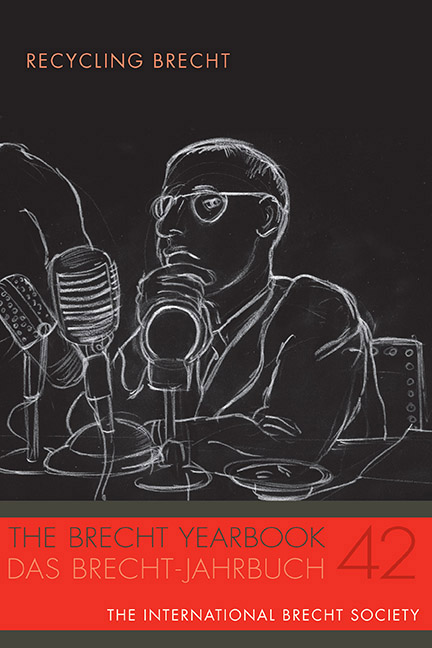Violence & Learning: Scenario 2
Published online by Cambridge University Press: 09 April 2021
Summary
Introduction
The script we are presenting below is one of four different scenarios from Violence & Learning by Henrik Bromander and John Hanse, which was performed at the International Brecht Society's Symposium in Oxford in June 2016.
The learning play Violence & Learning has been developed and performed in the context of left-wing activism in Sweden. The different variants of the play have partly been played out and developed in theater houses, but mainly in social centers, squatted buildings and other places of importance for the left-wing movement. This movement is also examined and discussed in the performance. Every performance has been followed by an open discussion, which aimed at being a starting point for further discussions—discussions that have been beneficial for us when gathering more material, and even changing the script for the next performance. The focus of these discussions has varied a lot depending on the place and the participators.
The starting point of the project and the structure of the play is inspired by Die Maßnahme (The Decision) by Bertolt Brecht. The idea is to make the participants, alongside the actors, reenact a number of fictional events such as a strike, a riot, and a blockade—all are of great material and symbolic value for the contemporary radical left. In a similar way that the police officers prepare themselves for crowd control (not only through lectures, but also by setting up and playing out scenarios), we can prepare ourselves physically for a discussion about political means and ends. We want to examine the embodied knowledge that is inherent in a certain action or situation, and in a larger context understand the tacit knowledge of a political practice or a social movement. The opportunity to move from the role of a bystander to the role of a participant, and vice versa, facilitates the possibility to scrutinize the political action itself. On a more general level, the performance enables a theoretical discussion about organized political practice.
Our main objective is that the performance should be a relevant part of the discussion about political means and ends in grassroots political movements, thus enabling the participants to examine and experience the political movement they are a part of from both a micro and macro perspective.
- Type
- Chapter
- Information
- The Brecht Yearbook / Das Brecht-Jahrbuch 42Recycling Brecht, pp. 244 - 255Publisher: Boydell & BrewerPrint publication year: 2018

